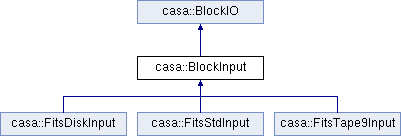|
casa
$Rev:20696$
|
|
casa
$Rev:20696$
|
fixed-length blocked sequential input base class More...
#include <blockio.h>

Public Member Functions | |
| BlockInput (const char *, int, int=1, FITSErrorHandler errhandler=FITSError::defaultHandler) | |
| Construction can be done either from a filename or from a file descriptor. | |
| BlockInput (int, int, int=1, FITSErrorHandler errhandler=FITSError::defaultHandler) | |
| virtual | ~BlockInput () |
| virtual char * | read () |
| read the next logical record or first skip N logical records and then read the next one. | |
| virtual char * | skip (int) |
fixed-length blocked sequential input base class
| casa::BlockInput::BlockInput | ( | const char * | , |
| int | , | ||
| int | = 1, |
||
| FITSErrorHandler | errhandler = FITSError::defaultHandler |
||
| ) |
Construction can be done either from a filename or from a file descriptor.
The remaining arguments are the the logical record size and number of records that make up a physical record followed by the output stream that is used to write error messages to.
| casa::BlockInput::BlockInput | ( | int | , |
| int | , | ||
| int | = 1, |
||
| FITSErrorHandler | errhandler = FITSError::defaultHandler |
||
| ) |
| virtual casa::BlockInput::~BlockInput | ( | ) | [virtual] |
| virtual char* casa::BlockInput::read | ( | ) | [virtual] |
read the next logical record or first skip N logical records and then read the next one.
(note it is not possible to skip a record without reading a record).
Caution: these functions return a pointer to an internal record; The user must make sure that after destruction of this class no dangling pointers are left;
| virtual char* casa::BlockInput::skip | ( | int | ) | [virtual] |
Reimplemented in casa::FitsDiskInput.
 1.8.0
1.8.0